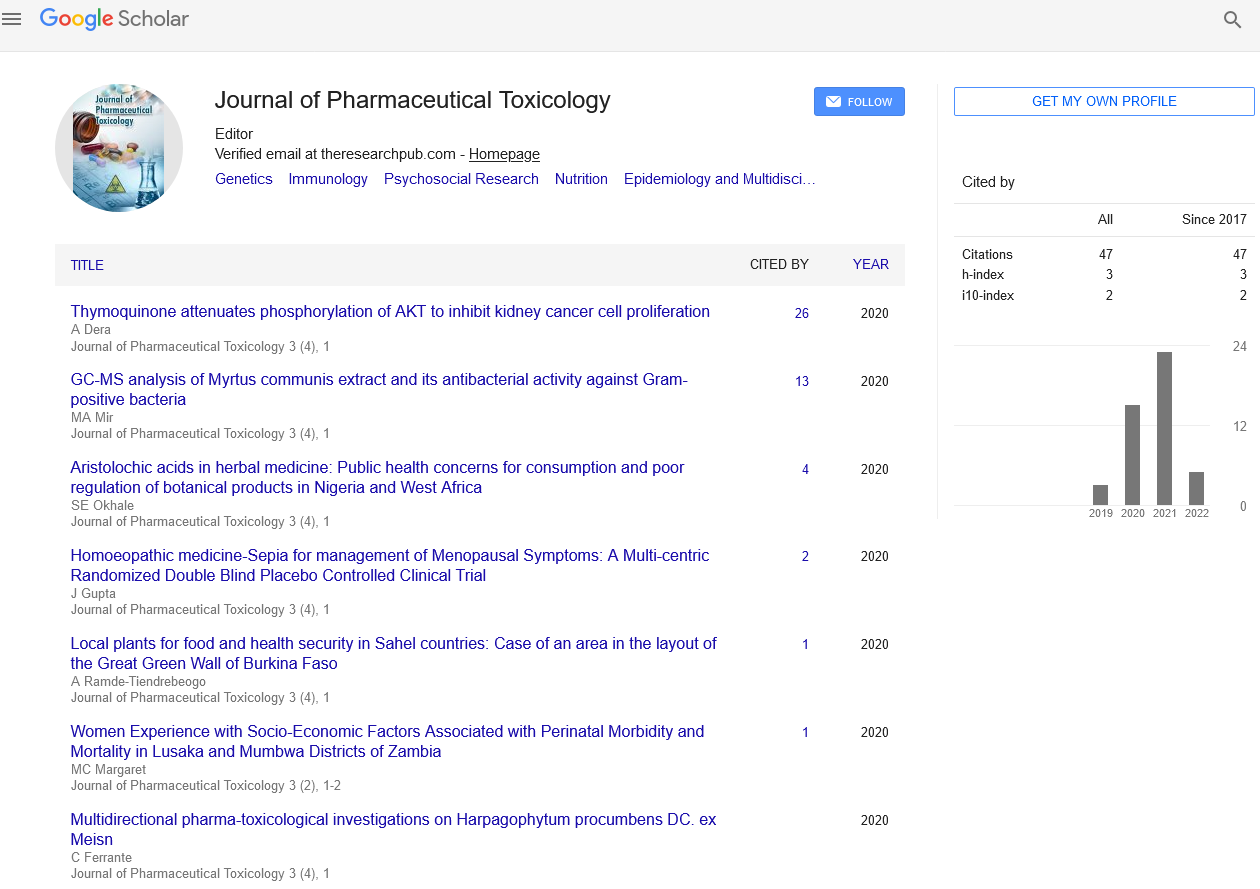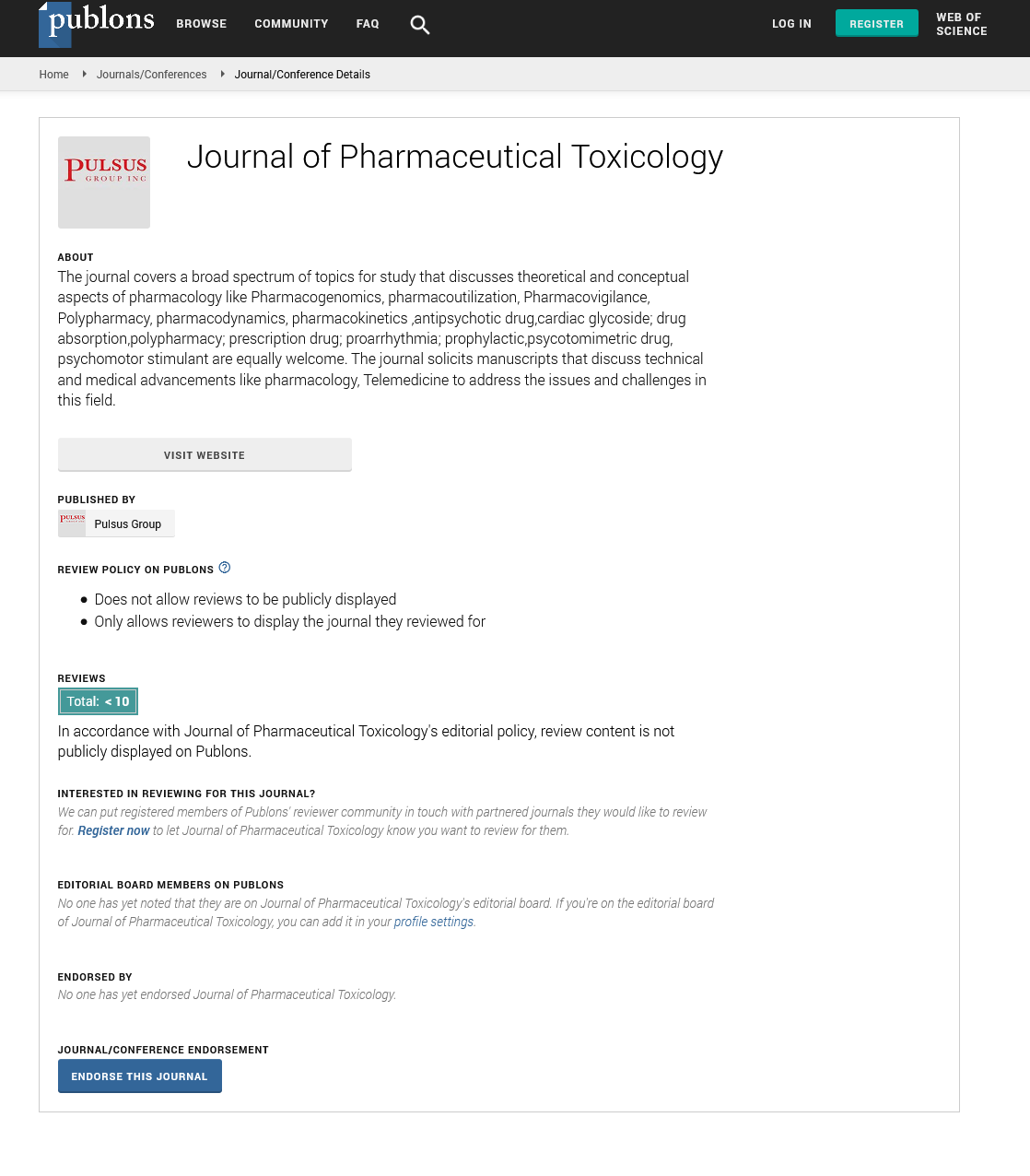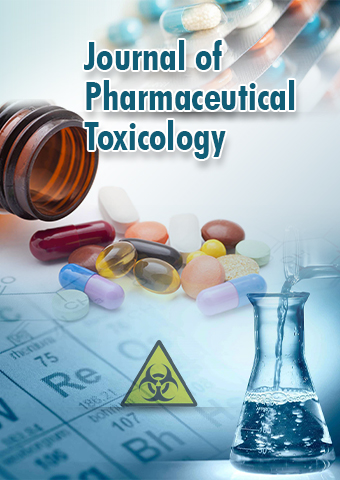Editorial - Journal of Pharmaceutical Toxicology (2023) Volume 6, Issue 4
Drug Repurposingâ??s Contribution to Pharmacy Research Advancement
Raj Malhotra*
University Eklavya Colleage of Pharmacy, Tasgoan Department of Quality Assurance, India
University Eklavya Colleage of Pharmacy, Tasgoan Department of Quality Assurance, India
E-mail: rajmalhotra2@gmail.com
Received: 01-August-2023, Manuscript No. oajpt-23-108591; Editor assigned: 3- August -2023, PreQC No. oajpt-23-108591 (PQ); Reviewed: 17- August -2023, QC No. oajpt-23-108591; Revised: 22- August -2023, Manuscript No. oajpt-23-108591 (R); Published: 28- August -2023; DOI: 10.37532/ jpt.2023.6(4).126-127
Abstract
Pharmaceuticals often referred to as drugs or medicines, are substances or compounds that are designed and developed to prevent, diagnose, treat, or alleviate various medical conditions and diseases in humans and animals. These substances play a crucial role in modern healthcare, helping to improve the quality of life, extend lifespans, and reduce the burden of illnesses on individuals and society. Pharmaceuticals, commonly referred to as drugs or medications, are substances used to diagnose, treat, cure, or prevent diseases and medical conditions in humans and animals. They are an essential part of modern medicine and play a crucial role in improving public health and prolonging life.
Introduction
The pharmaceutical industry encompasses a wide range of activities, including research, development, manufacturing, distribution, and marketing of pharmaceutical products. Here are some key aspects of pharmaceuticals. Pharmaceuticals have significantly contributed to medical advancements and have played a crucial role in managing and curing numerous diseases, ranging from infections to chronic conditions like diabetes, hypertension, and cancer. However, their development and use also come with challenges, such as the risk of side effects, drug interactions, and the cost of healthcare. Therefore, their research, regulation, and appropriate usage are critical aspects of modern healthcare systems Pharmaceuticals, also known as drugs or medications, are substances designed to diagnose, treat, cure, prevent, or alleviate diseases, disorders, or medical conditions in humans and animals. They play a crucial role in modern healthcare and are developed through extensive research, testing, and regulatory approval processes to ensure their safety and effectiveness [1-3].
Discussion
Distribution and Marketing: After manufacturing, the pharmaceuticals are distributed to healthcare providers, pharmacies, hospitals, and other medical facilities. Pharmaceutical companies often engage in marketing activities to promote their products to healthcare professionals and raise awareness among patients. Pharmaceuticals, also known as drugs or medications, are substances used to diagnose, treat, prevent, or cure diseases and medical conditions in humans and animals. They play a crucial role in modern healthcare, helping to alleviate symptoms, improve quality of life, and sometimes even cure illnesses Therefore, their research, regulation, and appropriate usage are critical aspects of modern healthcare systems Pharmaceuticals, also known as drugs or medications, are substances designed to diagnose, treat, cure, prevent, or alleviate diseases, disorders, or medical conditions in humans and animals. They play a crucial role in modern healthcare and are developed through extensive research, testing, and regulatory approval processes to ensure their safety and effectiveness [4-6].
Pharmaceutical drugs are developed through extensive research and testing, starting with basic laboratory studies and eventually progressing to clinical trials involving human subjects. The drug development process is a complex and lengthy one, taking several years and requiring significant financial investment. It’s essential to use pharmaceutical drugs responsibly and under the guidance of a healthcare professional to ensure safety and effectiveness. Misuse or improper use of medications can lead to adverse reactions, drug interactions, and other health risks. Always follow the prescribed dosage and instructions, and consult your healthcare provider if you have any questions or concerns about a particular medication [7,8]. Pharmaceuticals, commonly referred to as drugs or medications, are substances used to diagnose, treat, cure, or prevent diseases and medical conditions in humans and animals. They are an essential part of modern medicine and play a crucial role in improving public health and prolonging life [9,10].
Conclusion
Pharmaceutical drugs can come in various forms, such as tablets, capsules, liquids, injections, creams, and more. They are typically developed through extensive research and testing, including preclinical studies and clinical trials, to ensure their safety and effectiveness. However, their development and use also come with challenges, such as the risk of side effects, drug interactions, and the cost of healthcare. Therefore, their research, regulation, and appropriate usage are critical aspects of modern healthcare systems Pharmaceuticals, also known as drugs or medications, are substances designed to diagnose, treat, cure, prevent, or alleviate diseases, disorders, or medical conditions in humans and animals. They play a crucial role in modern healthcare and are developed through extensive research, testing, and regulatory approval processes to ensure their safety and effectiveness.
References
- Berthe–Aucejo A, Nguyen PKH, Angoulvant F et al. Retrospective study of irrational prescribing in French paediatric hospital: Prevalence of inappropriate prescription detected by Pediatrics: Omission of Prescription and Inappropriate prescription (POPI) in the emergency unit and in the ambulatory setting.BMJ Open.9, 45–66 (2015).
- Al Balushi KA, Al–Sawafi F, Al–Ghafri F et al. Drug utilization pattern in an Omani pediatric population.J Basic Clin Pharm.4, 68–72 (2014).
- Al–Badri A. Almuqbali J, Al–Rahbi K et al. A Study of the Paediatric Prescriptions at the Tertiary Care Hospital in Oman.J Pharmaceut. Res.5, 17–56 (2020).
- Al–Maqbali, Haridass S, Hassali M et al. Analysis of Pediatric Outpatient Prescriptions in a Polyclinic of Oman. GlobJ Med Res.19, 2249–4618 (2019).
- Bakaki PM, Horace A, Dawson N et al. Defining pediatric polypharmacy: A scoping review.PLoS ONE.13, 56–99 (2018).
- Lemeshow S, Hosmer DW. A review of goodness of fit statistics for use in the development of logistic regression models.Am J. Epidemiol.115, 92–106 (1982).
- Wallace E, McDowell R, Bennett K et al. Impact of Potentially Inappropriate Prescribing on Adverse Drug Events, Health Related Quality of Life and Emergency Hospital Attendance in Older People Attending General Practice: A Prospective Cohort Study.J Gerontol A Biol Sci Med Sci.72, 271–277 (2017)
- Cahir C, Moriarty F, Teljeur C et al. Potentially inappropriate prescribing and vulnerability and hospitalization in older community–dwelling patients.Ann Pharmacother.48, 1546–1554 (2018).
- Cullinan S, O’Mahony D, Fleming A et al. A meta–synthesis of potentially inappropriate prescribing in older patients.Drugs Aging.31, 631–638(2014).
- Liew TM, Lee CS, Goh Shawn KL et al. Potentially Inappropriate Prescribing Among Older Persons: A Meta–Analysis of Observational Studies.Ann Fam Med.17, 257–266 (2019).
Indexed at, Google Scholar, Crossref
Indexed at, Google Scholar, Crossref
Indexed at, Google Scholar, Crossref
Indexed at, Google Scholar, Crossref
Indexed at, Google Scholar, Crossref
Indexed at, Google Scholar, Crossref


